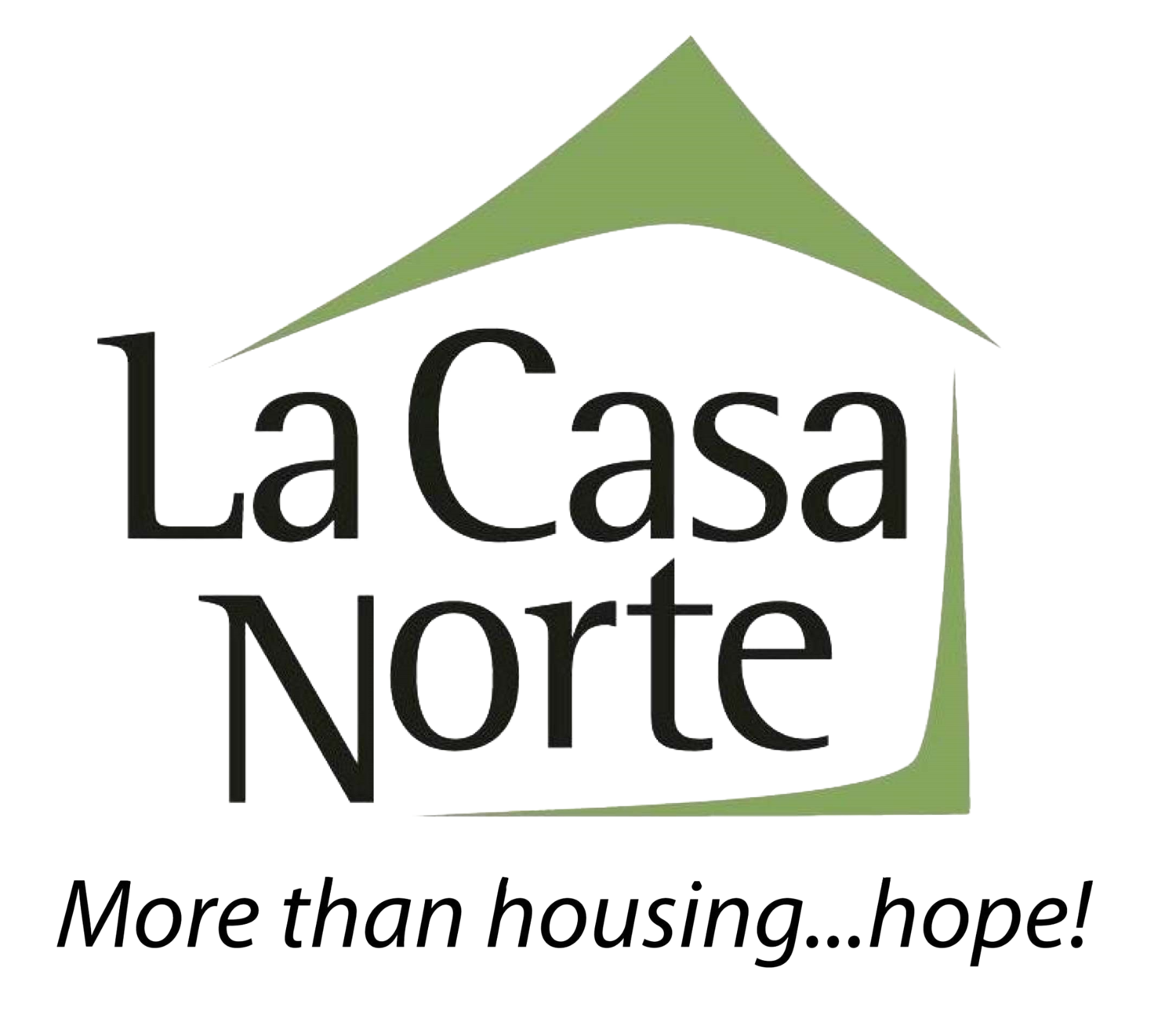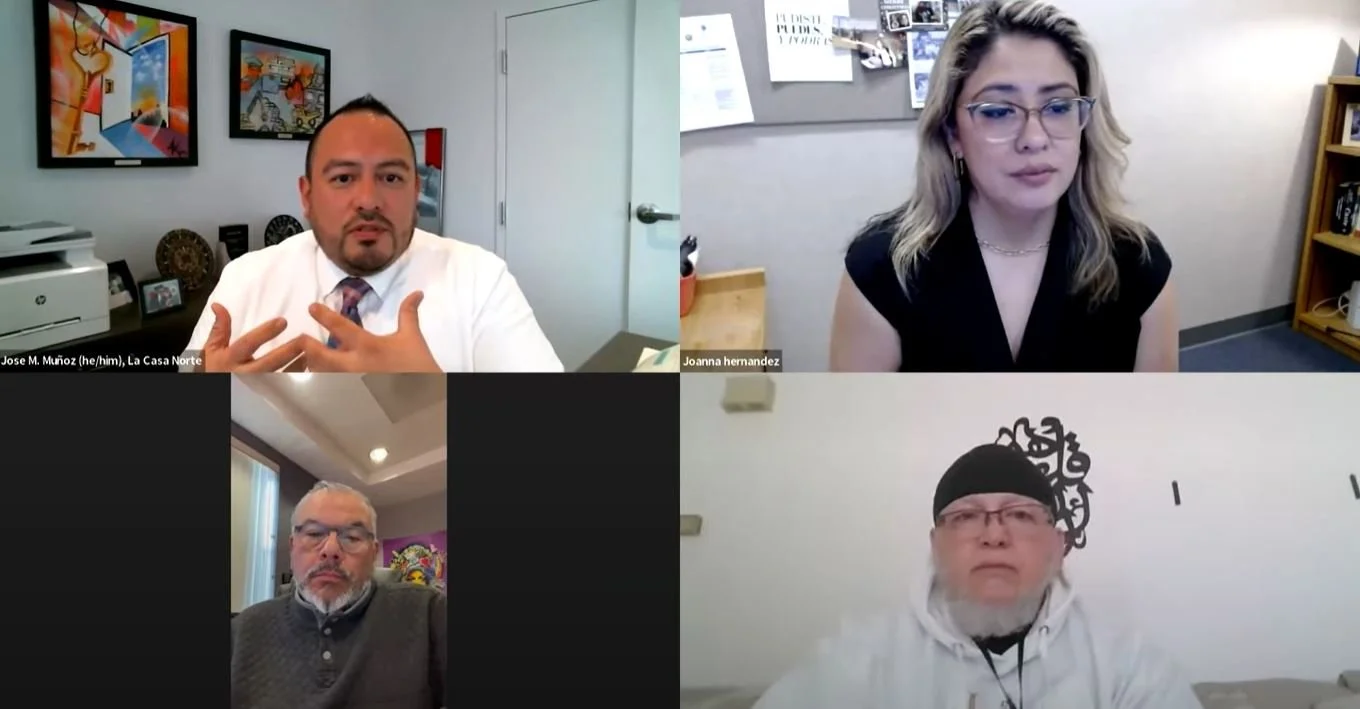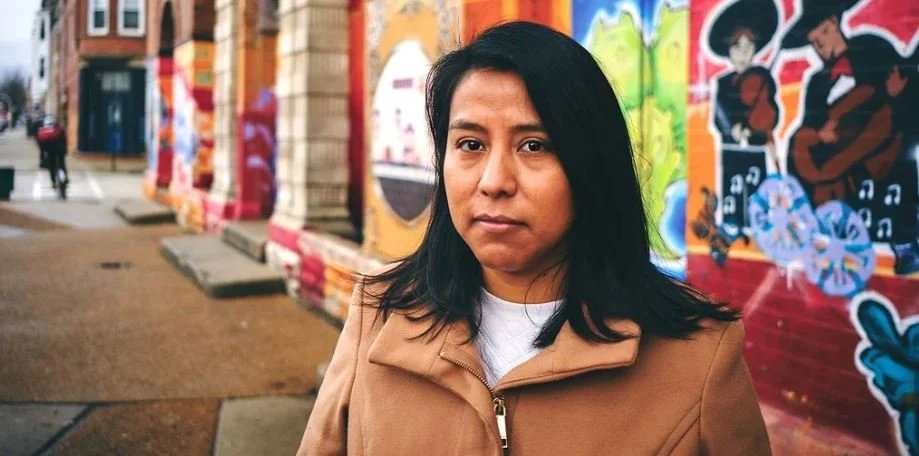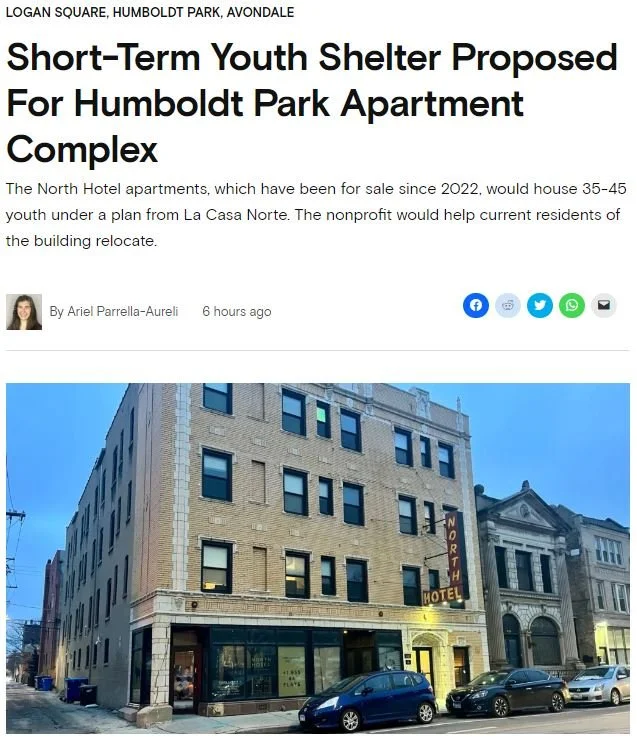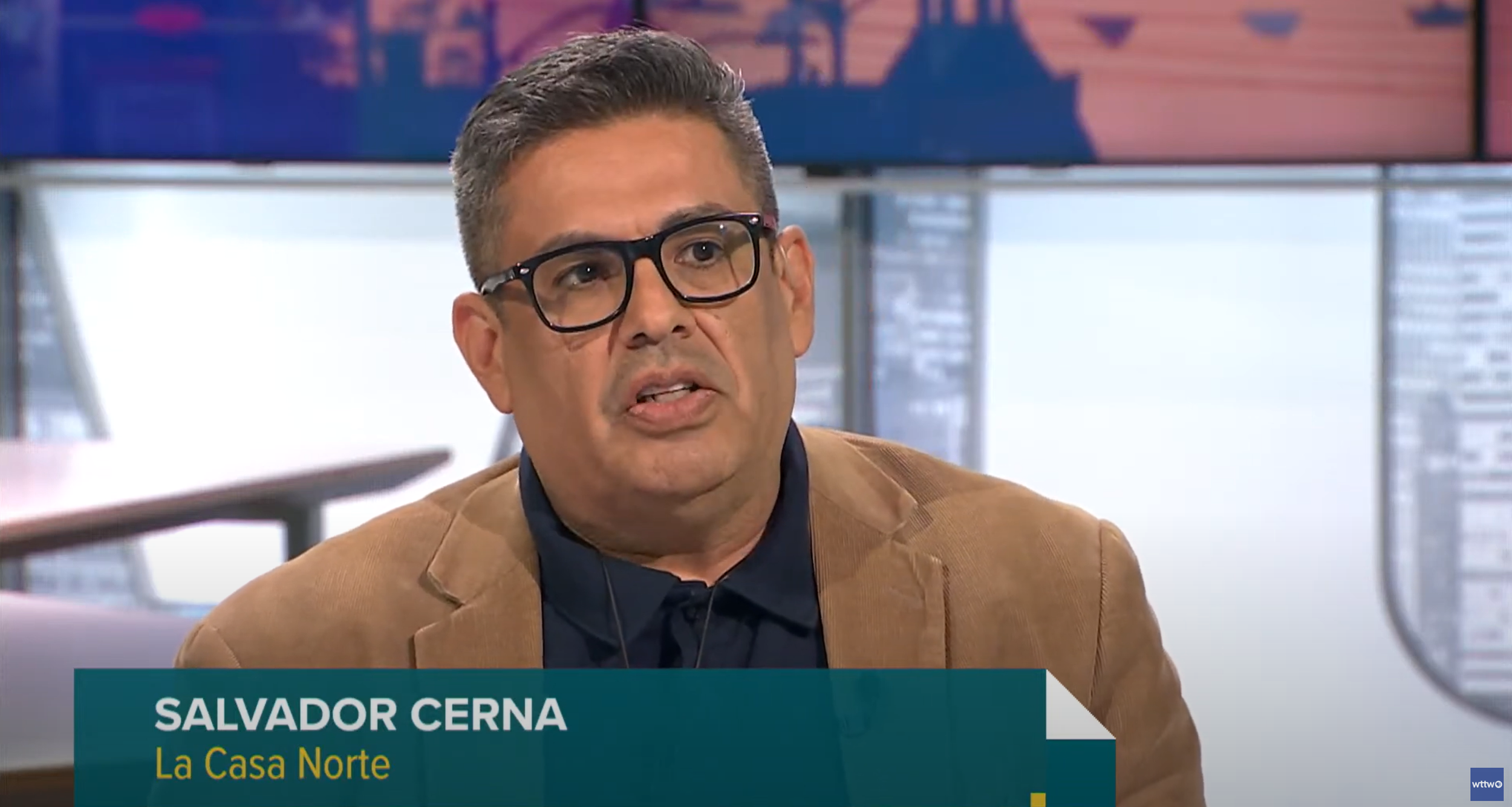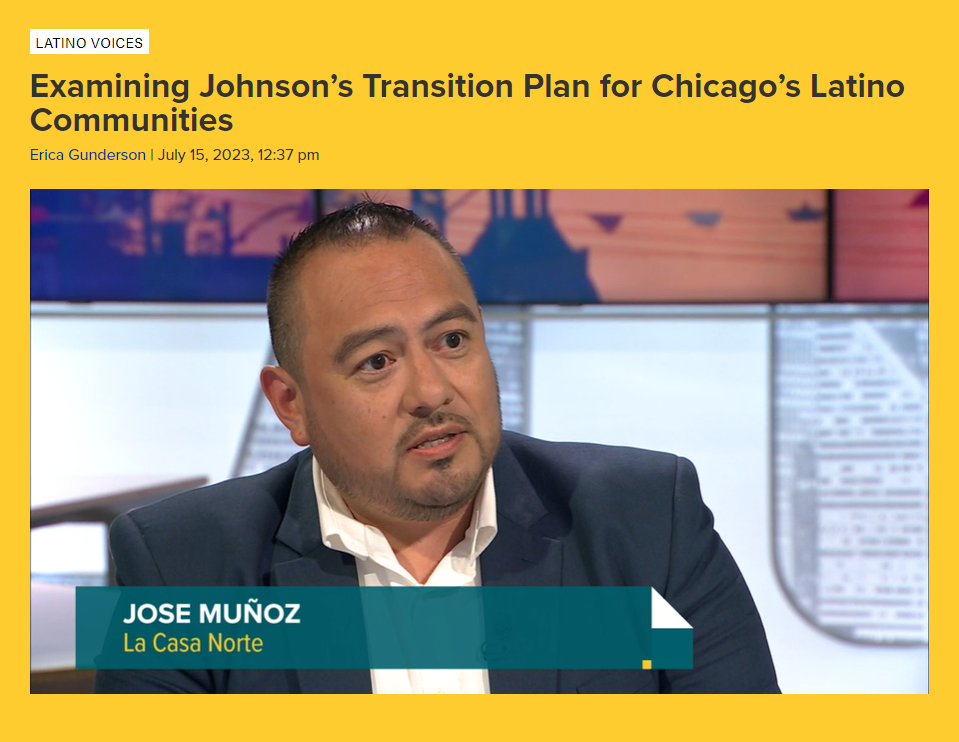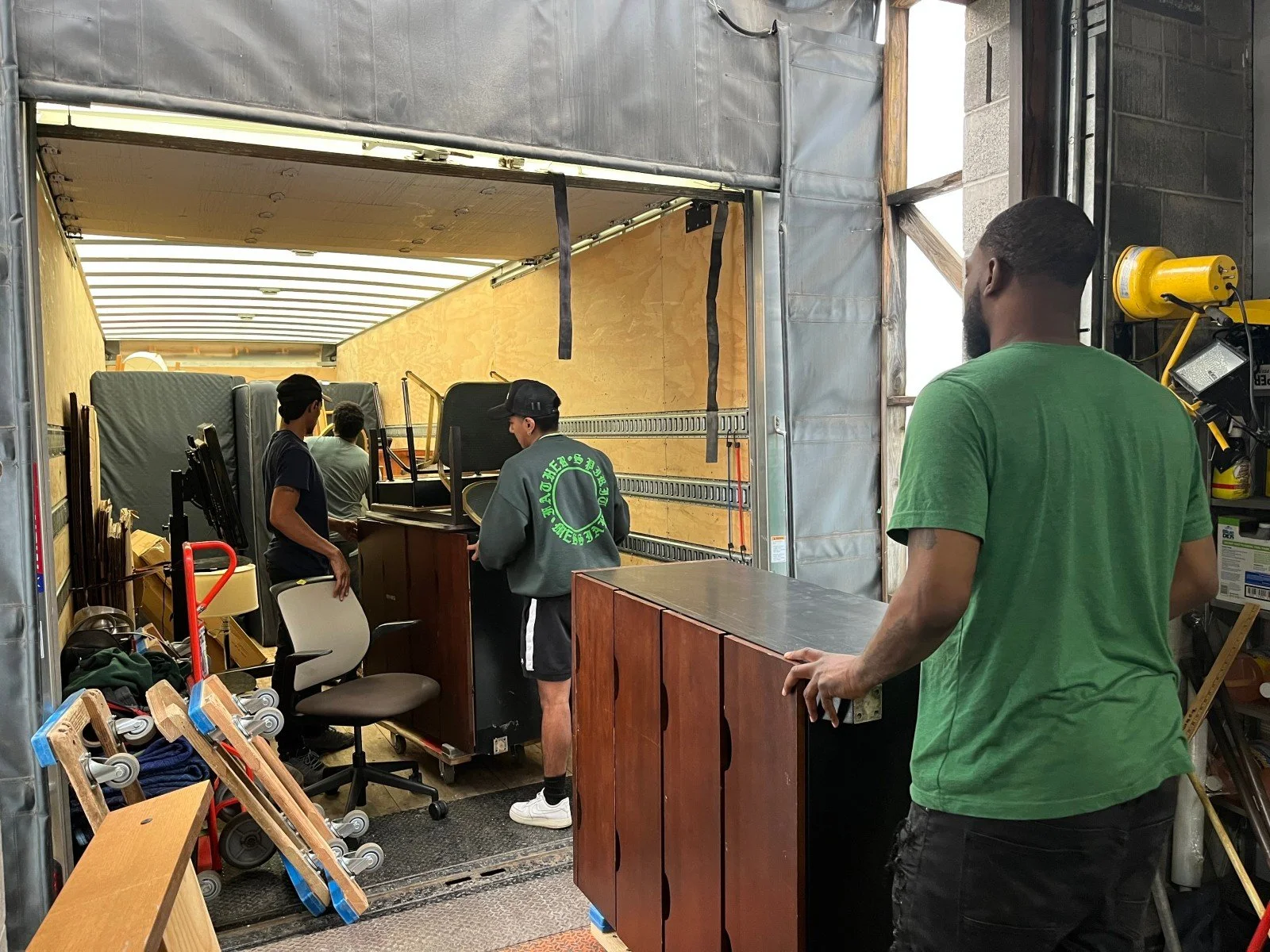In The News
Catch up on media reports that feature La Casa Norte
WTTW - February 26, 2024 La Casa Norte Executive Director Jose M. Muñoz joins WTTW’s Chicago Tonight: Latino Voices for a community conversation with Casa Central and the Ojalá Foundation to discuss the growing number of individuals experiencing homelessness in Chicago.
Chicago's migrant crisis raises questions of equity
Credit: Geoffrey Black | Pictured: Eréndira Rendón
By Judith Crown, Crain Business Chicago - February 20, 2024
The migrant crisis has brought to light inequality in the way immigrants are treated. Members of the city’s undocumented Latino community like Garcia are angry when they see newly arrived immigrants from Venezuela able to obtain work permits, which gives them access to better-paying jobs.
Other communities are infuriated, too, pointing out that public funding to shelter and feed migrants is money that might otherwise be used to further address the city’s daunting social problems, such as homelessness, mental illness and poverty. How is it that new arrivals are assigned to city shelters while there are tent camps in Humboldt Park and Columbus Park and along the Eisenhower Expressway?
“The immigration system is not equitable,” says Jose M. Muñoz, executive director of La Casa Norte, which serves youth confronting homelessness. “It never has been.”
Federal immigration rules reflect a response to world crises, so the outcomes often appear arbitrary and inconsistent. Refugees from Ukraine received parole, a status that enabled them to fly in and apply for work permits. There are no blanket protections for migrants from Venezuela. Those who arrived before July 31, 2023, can apply for a status that protects them from deportation and enables them to obtain a work permit. But migrants who arrived in August or later face a more difficult path. The federal government has extended some protections to refugees amassing at the Southern border — not just from Venezuela, but also from Nicaragua, Haiti and Cuba.
Read the full story: here
La Casa Norte leaders are proposing to take over the North Hotel apartments at 1622 N. California Ave., seen Jan. 10, 2024, to operate a non-congregate youth shelter. Photo credit: Ariel Parrella-Aureli/Block Club Chicago
By Ariel Parrella-Aureli, Block Club Chicago - January 11, 2024
HUMBOLDT PARK — City officials and community members hope to turn an occupied apartment complex into transitional housing for youth experiencing homelessness in Humboldt Park.
La Casa Norte, in partnership with the city’s departments of housing and family and support services and the Illinois Department of Human Services, wants to take over the North Hotel apartments at 1622 N. California Ave. to operate a non-congregate shelter that would house 35-45 people ages 18-24.
The proposal is one of five grantees of the Department of Housing’s Non-Congregate Shelter Acquisition Program, which launched in 2022 to address homelessness in Chicago’s neighborhoods and generate an equitable recovery from the pandemic. Two of the five proposed shelters will house youth, housing department officials said.
The Humboldt Park shelter, [RISE] for Chicago Youth, will provide a safe path forward for homeless young people via educational and social services, officials said at a Wednesday community meeting hosted by Ald. Jessie Fuentes (26th) at La Casa Norte, 3533 W. North Ave.
Read the full story: here
WTTW - November 30, 2023 Salvador Cerna, La Casa Norte’s Director of Community Impact and Special Projects, discusses Chicago’s homelessness crisis on WTTW’s Chicago Tonight: Latino Voices.
WTTW - July 15, 2023 La Casa Norte Executive Director Jose M. Muñoz and Board Vice President Juan Morado, Jr. sit down with WTTW’s Chicago Tonight: Latino Voices to discuss Mayor Brandon Johnson’s transition plan for Chicago’s Latinx communities.
The need for rental help in Chicago grows with an influx of asylum seekers. But finding landlords and money to help is hard.
By Tessa Weinberg, WBEZ Chicago - June 20, 2023
It’s already difficult for most renters to find an apartment in Chicago’s tight rental market. Finding landlords to take in migrants and asylum seekers, and potentially overlook a lack of credit scores and rental history, can be even harder.
“The new arrivals that we’re working with, you know they just got to the United States. So they don’t have any of that,” said Luz Maria Cortez, a community assistance program manager for La Casa Norte, one of the organizations working with city shelters to help asylum seekers apply for rental assistance. “So more than 90% of the time, I would say that they’re getting denied for those apartments,” from large property management companies.
Nonprofit organizations assisting asylum seekers said they’re often looking for housing in walkable, Spanish-speaking communities. But they’re limited by a dearth of affordable housing. The amount of monthly rent that will be covered by the program is ultimately set by federal caps that take into account a unit’s size and ZIP code.
Read the full story: here
Zillow awards $100,000 to organizations dedicated to fair housing and ending homelessness
The recipients were selected by Zillow employees during Fair Housing Month
Zillow Group - May 15, 2023
Zillow® employees have selected 10 community-based organizations to receive a total of $100,000 from Zillow to help support their fair housing and housing security efforts, underscoring Zillow’s commitment to removing barriers to housing. This community grant campaign ran throughout National Fair Housing Month this past April.
“Zillow’s employees are always working to find ways to help more people find home,” said Aldona Clottey, vice president of corporate responsibility at Zillow. “We are proud that our employees are supporting nonprofits working to knock down barriers and open doors to housing in their communities.”
Zillow employees selected 10 organizations dedicated to ending homelessness or expanding access to fair, equitable and affordable housing across the country. Each of the organizations — listed below — will be awarded $10,000:
Africatown Community Land Trust acquires and develops land to preserve the Black diaspora community in the Seattle area.
The Ali Forney Center is a New York City–based organization that provides stability and support for LGBTQ+ homeless youths.
La Casa Norte serves youths and families experiencing homelessness in Chicago.
Enterprise Community Partners is a national organization based in Baltimore that works to create resilience and upward mobility.
Families Moving Forward helps families experiencing the crisis of homelessness find their way home in Durham, North Carolina.
Mary’s Place is a Seattle-based nonprofit that works to ensure that no child sleeps outside.
The National Low Income Housing Coalition is dedicated to achieving racially and socially equitable public policy.
National Housing Law Project advances housing justice for poor people and communities.
Openhouse is a San Francisco organization that enables LGBTQ+ seniors to overcome challenges they face as they age.
Parity is a Baltimore-based organization that rehabilitates abandoned properties, creating opportunities for affordable homeownership.
Zillow works to improve housing security and economic opportunity for underserved communities across our products and platform. This work includes partnerships with Housing Connector, and product features such as displaying down payment assistance programs for prospective home buyers and including fair housing resources and local legal protections on home listings.
To learn more about Zillow’s fair housing research, visit our economic research hub, which shines a light on housing disparities and solutions to help all consumers better navigate the housing market.
Read the rest of the story: here
WGN’s Adelante Chicago spotlights El Mercadito food pantry
WGN News - April 22, 2023 La Casa Norte Executive Director Jose M. Muñoz and Nourishing Hope CEO Kellie O’Connell sit down with Adelante Chicago to discuss innovative food pantry partnership El Mercadito.
Runoff candidates have to put in the work to win over Latino voters
As Chicago’s second-largest racial and ethnic group and one of its fastest-growing demographics, Latinos have a powerful voice in determining the future of Chicago in the mayoral runoff.
By Jose M. Muñoz, Chicago Tribune – March 13, 2023
Securing the Latino vote is a path to victory, but candidates Brandon Johnson and Paul Vallas have a lot of work to do, and it is going to take more than endorsements to earn our vote. February’s election results made one thing resoundingly clear: Latino voters are not voting by identity politics but rather by political ideology and issues.
North Side Latino voters gave Johnson the surge he needed to secure a spot in the runoff. Even though they covered a small area of the city, Latino voters in neighborhoods such as Logan Square, Rogers Park, Uptown and Avondale turned out in large numbers. Vallas also did well in Latino-majority wards, on the Northwest and Southeast sides.
While Johnson and Vallas both ran effective campaigns that propelled them to the runoff, nearly half of Chicago voters supported other candidates — and neither candidate made significant gains on the West and South sides, especially among Latino voters.
The runoff candidates are going to have to put in the work to convince Latino voters they have real plans, not just talking points, to address the issues that matter most to us and demonstrate they recognize our significant contributions to the overall well-being of our city.
Latino voters are looking for a mayor who will deliver on promises of keeping our streets safe, making housing affordable and accessible, creating better jobs, building stronger schools and investing in our communities.
We are seeking equity and the opportunity to participate in how our city is run. We want a mayor who will prioritize hiring and appointing top leadership positions that reflect the demographics of our city.
We want a mayor who values the more than $97 billion Latinos contribute to our metro gross domestic product and who will provide investment and resources to grow that impact, proportionate to the needs of our community.
While we want a mayor who supports the Latino community, we do not want a candidate who will pit Black and brown communities against each other to compete for resources. A majority of voters want a mayor who understands Chicago’s Black and brown communities. According to a poll released in mid-February by Northwestern University and a coalition of Black and Latino nonprofits that oversampled Chicago’s Latino and Black voters — two groups often underrepresented by other polls — 70% of Latino and Black Chicagoans agree that our communities would be better off if we worked together instead of working on issues separately.
To draw attention to this point, groups such as the Illinois Latino Agenda, a coalition of 26 leaders from Latino-serving organizations, are working with partner organizations to host a Black and brown mayoral debate ahead of the runoff. Additionally, the ILA and its member organizations, the Hispanic Federation, La Casa Norte, the Puerto Rican Cultural Center and others launched a voter outreach campaign, VotaYaChicago.com, to increase Latino voter participation. The campaign includes knocking on the doors of 10,000 Latino households, sending 260,000 text messages, making about 130,000 calls and placing a public service announcement in Spanish-language media.
The Latino community and its leaders are doing their part to make our issues known and provide opportunities for candidates to garner our vote, but it is up to the mayoral candidates to do their part to engage us. Speak to us, inspire us, mobilize us and show us that you are ready to invest time, effort and resources to meet the needs of Chicago’s Latino communities — not just during the election, but for the long run — and you will win our vote.
Jose M. Muñoz is co-chair of the Illinois Latino Agenda and CEO of La Casa Norte, a nonprofit that helps unhoused youths and families.
Read the original story: here
Financial disparities in Cook County are almost double national average, study finds
Black and Latino residents are three to four times more likely to be financially vulnerable than their white counterparts.
By Michael Loria, Chicago Sun-Times - January 31, 2023
On weekends, Kathy Concepcion fixes big pots of spaghetti, ravioli, whatever her grandkids want — only lately “Lulu,” as they call her, has been stretched thinner than angel hair.
Between the price of rent and the rising cost of utilities and groceries, she has had to start going to a nearby food pantry.
“We wouldn’t be here if we could afford groceries,” she said, sitting inside the pantry at North and Central Park avenues in Humboldt Park.
Concepcion waited on a bench alongside half a dozen other women in the pantry run by Nourishing Hope at La Casa Norte. Almost all the women are Latino, and many are new to the pantry, which has doubled in size over the last year.
It’s a reflection of the deep divides that pervade the area, according to a new study, which found that financial disparities that exist across race nationally are amplified in Cook County.
The study, published Tuesday by the Financial Health Network, found that residents reported higher rates of being financially healthy, or able to save and pay bills, than the national average.
But residents also reported significantly higher rates of financial vulnerability, or being unable to save, than the national average — and race was a better indicator of participants’ financial health than it was nationally.
Black and Latino residents are three to four times more likely to be financially vulnerable than their white counterparts. And these disparities persist among relatively high earners.
The disparities found in the study are almost double the national average, where around 20% of Black and Latino Americans are likely to be financially vulnerable, compared with 12% of whites. The national rates were based on the financial research organization’s national surveys.
Asian residents were financially healthy at rates similar to whites, although they had lower rates than national levels. Those considered neither financially healthy or unhealthy were considered financially coping, or able to meet basic needs but unable to plan for the future.
Researchers surveyed 5,422 Cook County residents between April and July of 2022 with funding from The Chicago Community Trust, a foundation that aims to close the racial wealth gap in Cook County.
Read the rest of the story: here
Warm bed and a roof
Comcast Newsmakers - December 21, 2022
Executive Director Jose M. Muñoz talks with Ellee Pai Hong of Comcast Newsmakers about La Casa Norte, its work, and impact.
Advocates Call for City Support to Shelter Homeless Amid Winter Storm
WTTW - February 2, 2022 A new study from DePaul University shows the city experienced a 5.2% decline in affordable rental units over the past decade. The share of lower-income renters who face housing insecurity has also grown.
Local Groups Offer Hope and Housing to Chicagoans in Crisis
WTTW - January 29, 2022 Un estudio reciente de la Universidad de Chicago encontró que la falta de vivienda puede afectar negativamente el rendimiento académico y el éxito de un estudiante.
Advocacy Group Works To Get Homeless Into Shelters With Chicago Temperatures Plummeting
La Raza - 23 de agosto de 2021 Algunos padres de la CPS no se sienten cómodos de enviar a sus hijos a la escuela por el azote de la variante Delta del coronavirus y quieren que el distrito escolar les dé otras opciones de aprendizaje para este año escolar.
Chicago organizations help South Side youth get COVID-19 vaccine
ABC 7 - August 13, 2021 Increase the Peace and La Casa Norte are hosting an event that will equip Back of the Yards families with school essentials and COVID-19 vaccine.
